New York City Events
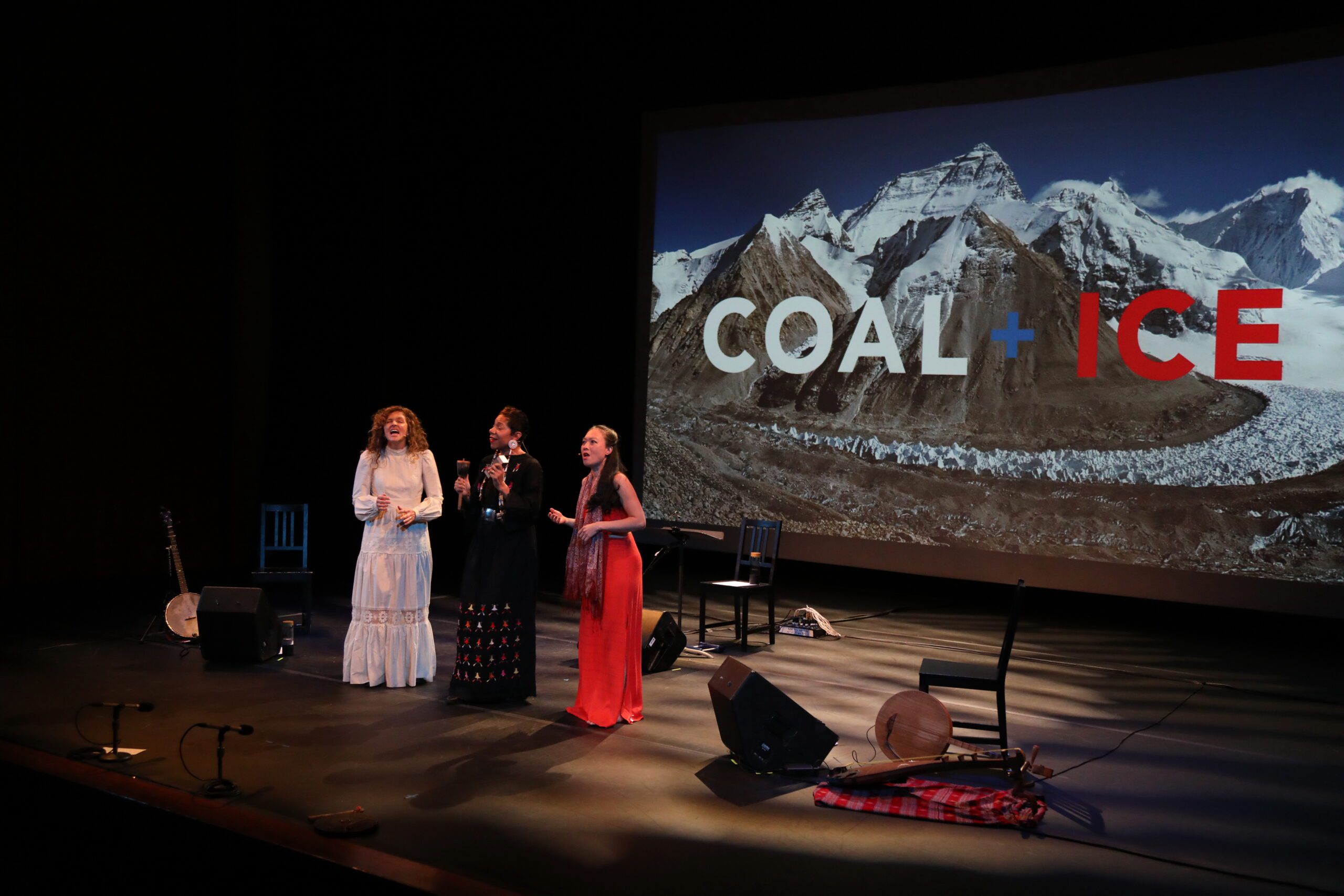
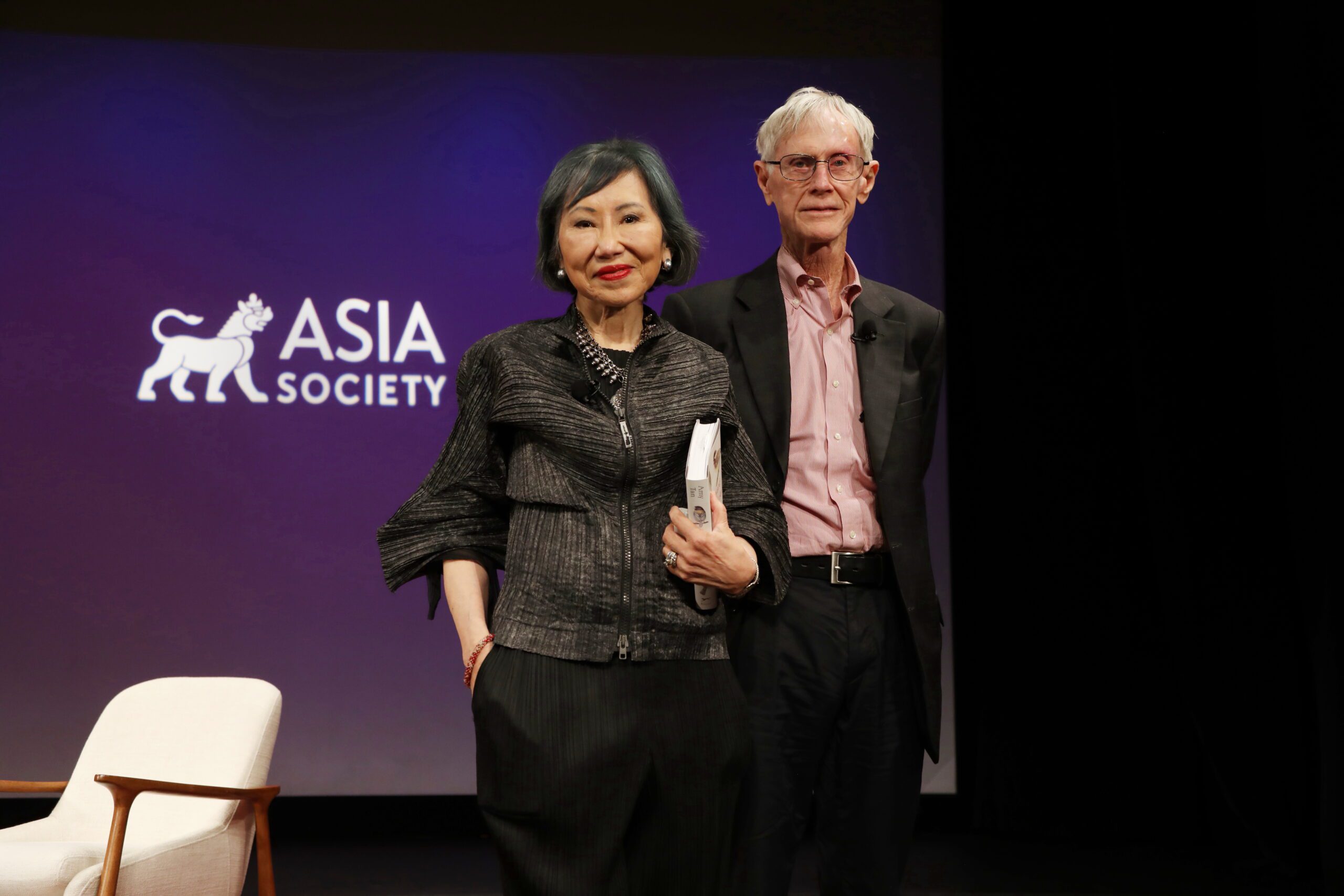
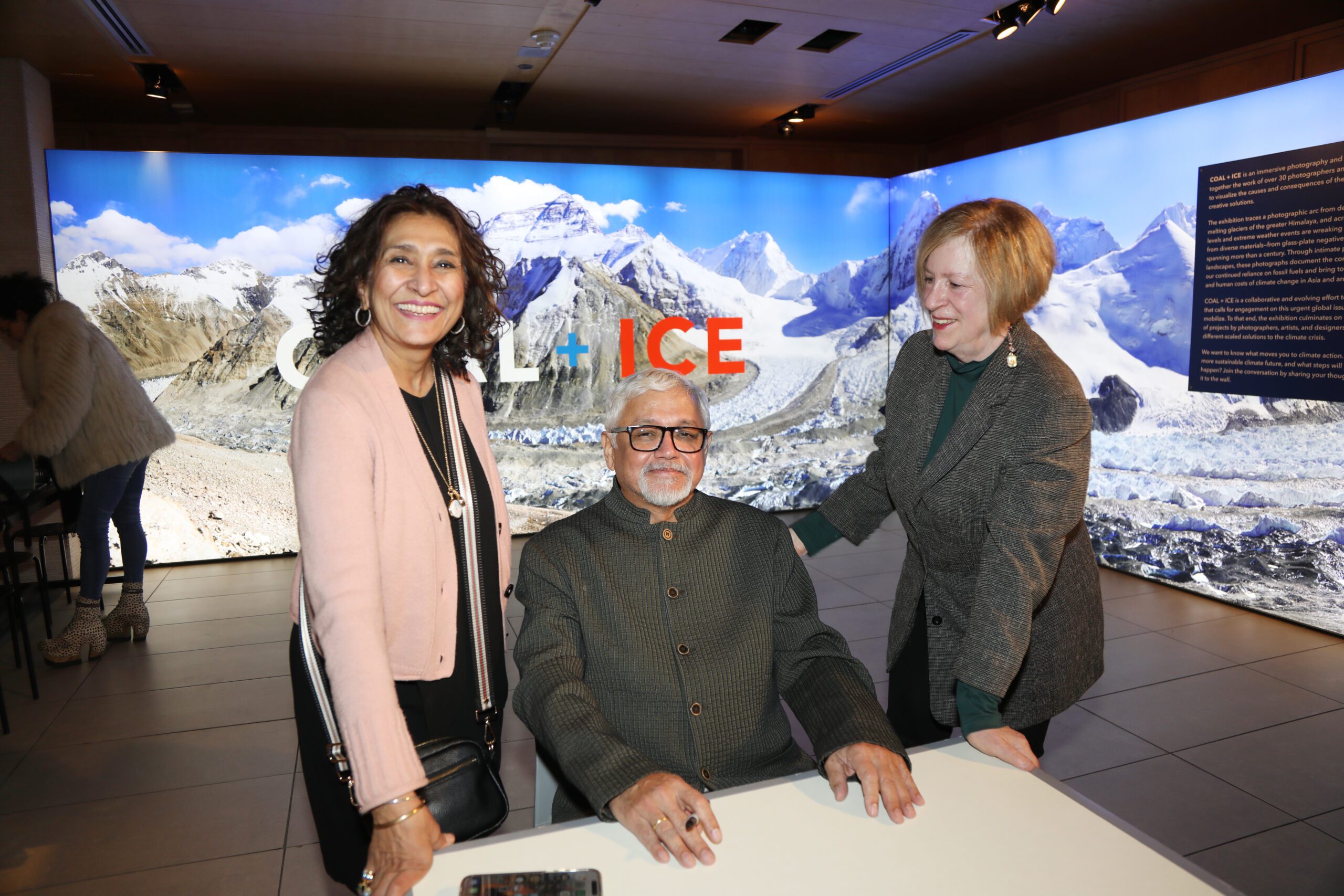
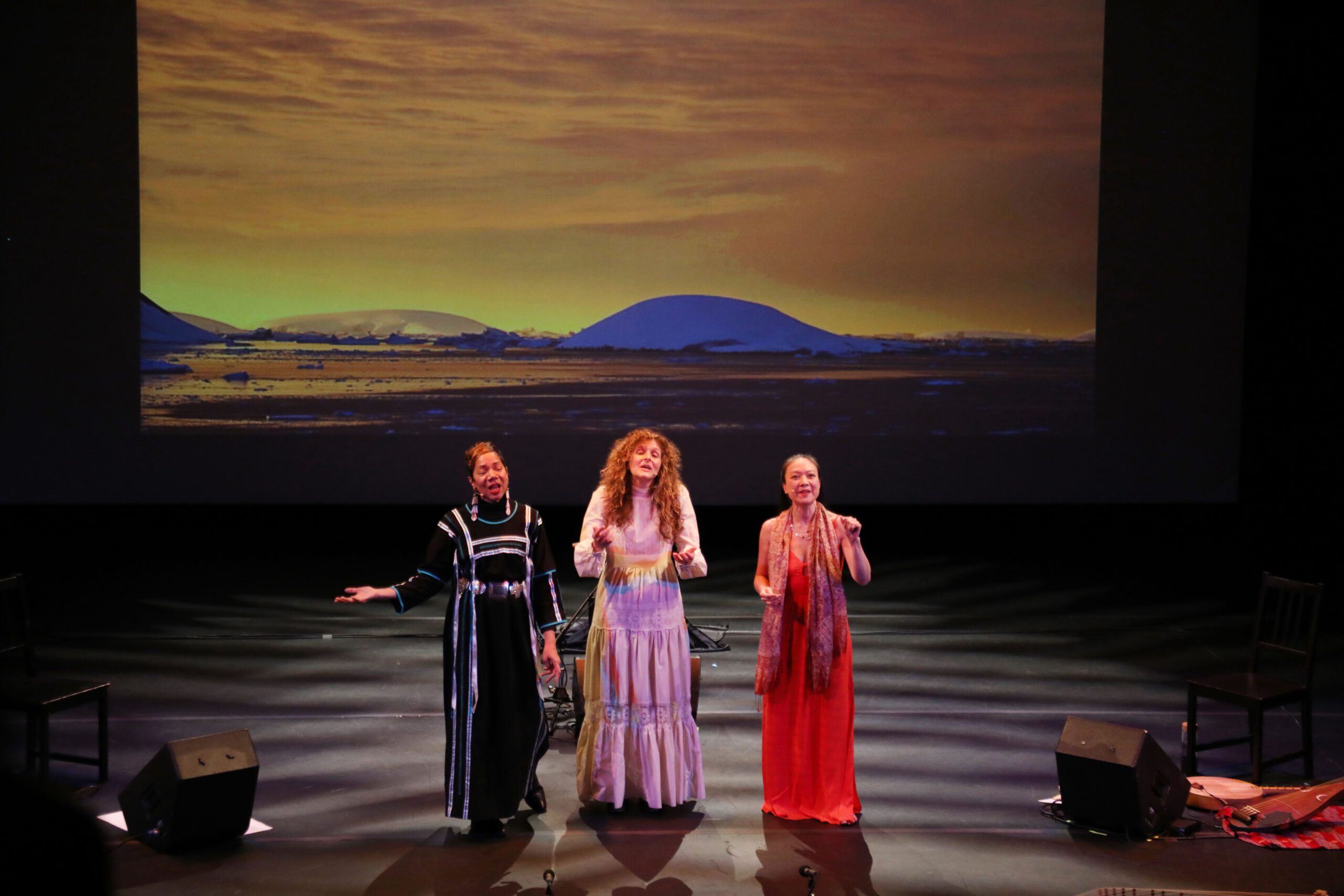

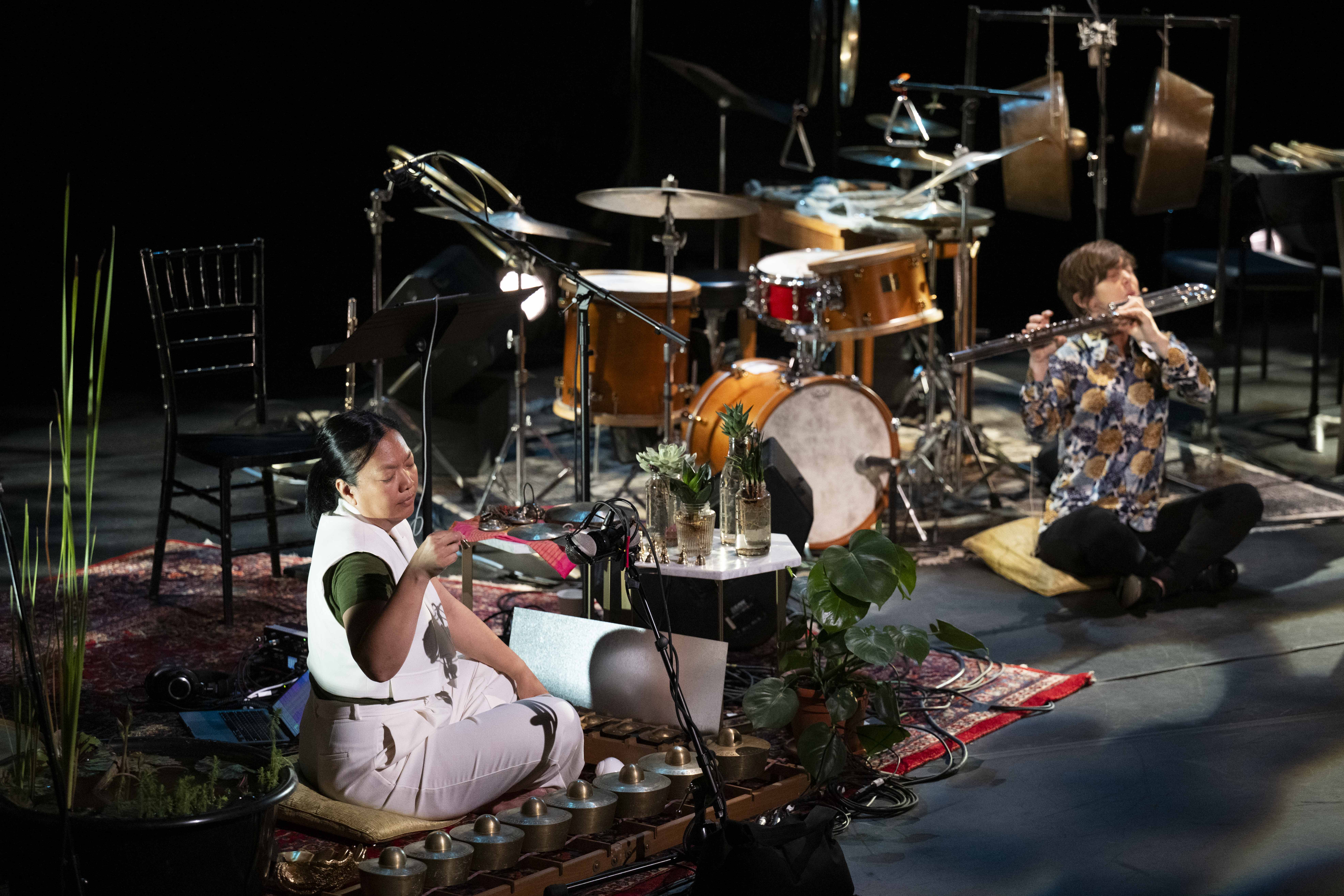
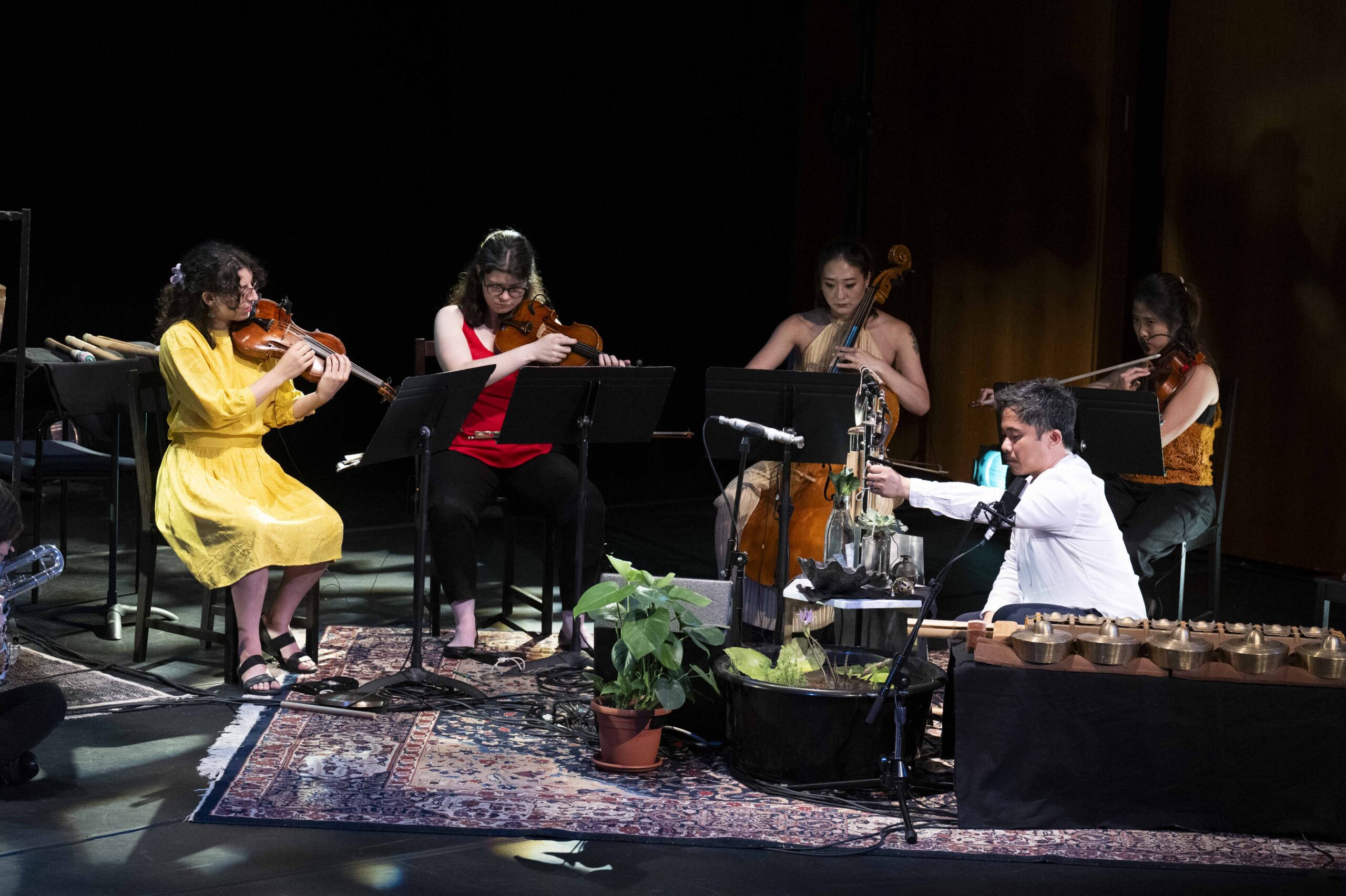
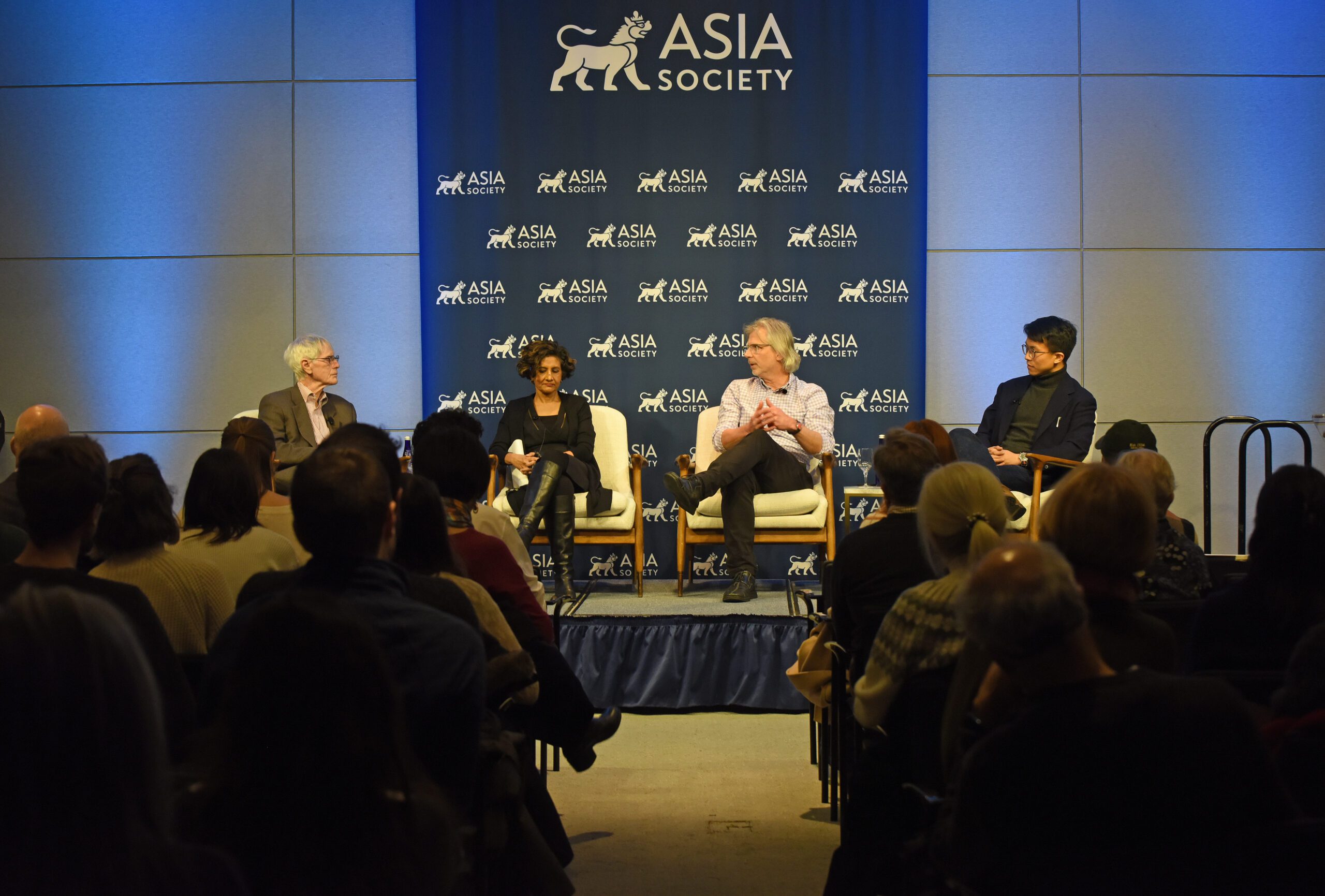
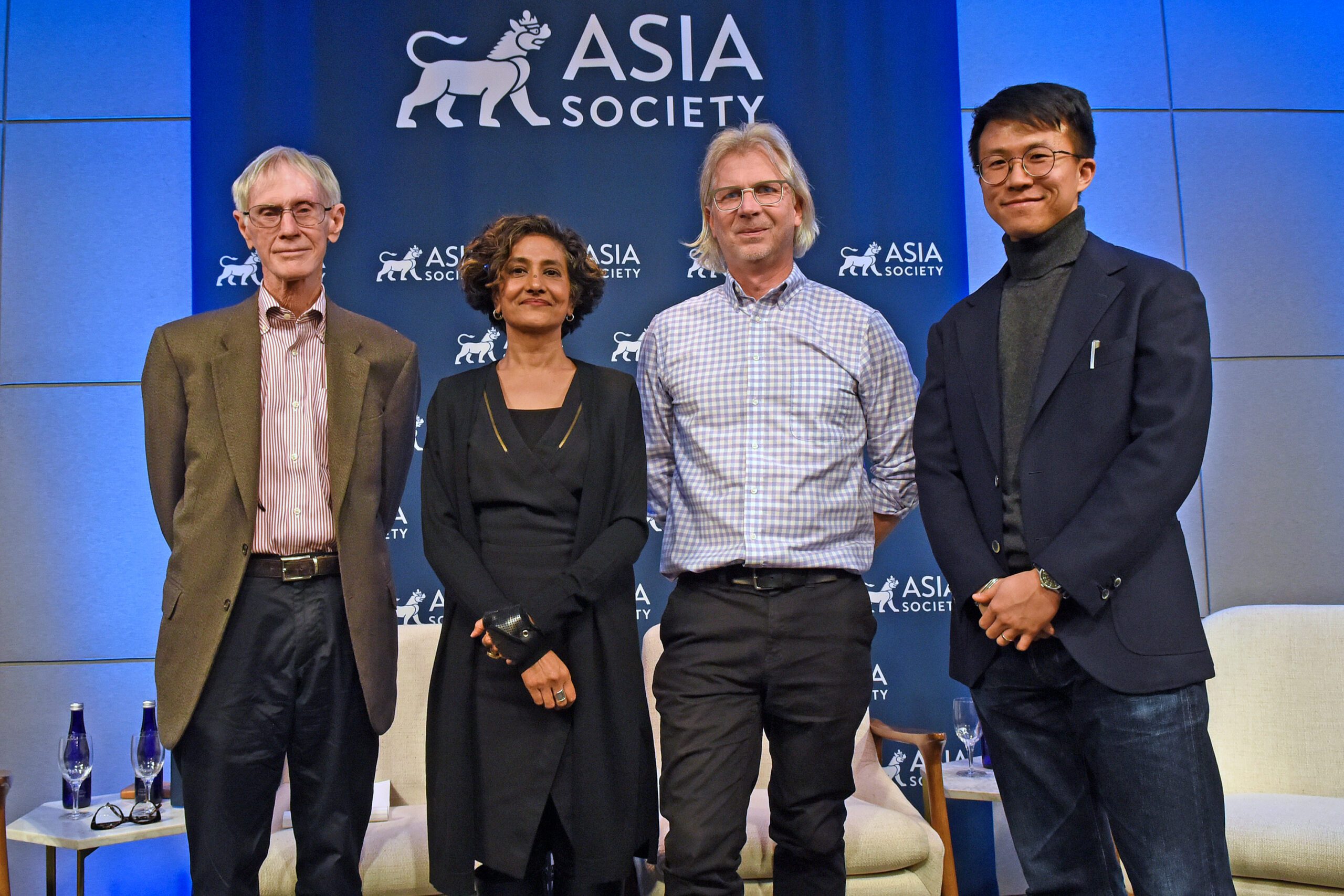
COAL + ICE at Asia Society New York centered six months of programming at the intersection of climate arts, policy, science, activism, and education.
COAL + ICE Opens at Asia Society New York
At the New York City debut of COAL + ICE at the Asia Society Museum, the exhibition’s creative team greeted visitors for an evening of art and music for our Earth.
Guests were invited to walk through the exhibition, enjoy the opening reception in Asia Society’s Garden Court, and witness the musical talents of Abigail Washburn, Martha Redbone and Jen Shyu in their Homage to the Earth. An extraordinary group of musicians, traversing traditions from classical to folk, joined forces and voices together for the first time ever in a collaborative evening of musical reverence for nature, driven by the urgency to defend life on our planet.
In this panel discussion, seasoned climate journalists Somini Sengupta, Raymond Zhong, and Jesse Pesta discussed how they have come to look at the climate challenge, parsing through questions of how well the media is getting through to the public, where lapses in coverage lie, and how we might awaken people to the challenges posed by climate change.
The Asia Society Center on U.S.-China Relations hosted Xu Bing, a trailblazer in the field of contemporary Chinese art, for a conversation about his musings on art and the environment.
Xu Bing presented his latest work and reflections in a conversation, diving into a riveting exploration of environmental challenges, artificial intelligence, and the universe.
In this collaboration with the South Asian Journalists Association (SAJA), COAL + ICE at the Asia Society presented the award-winning author Amitav Ghosh in conversation with Princeton professor and former BBC journalist Razia Iqbal. A recipient of India’s highest literary award, Ghosh discussed his latest book, Smoke and Ashes, which was named a Most Anticipated Book of 2024 by Foreign Policy, Literary Hub, and The Millions.
Moving deftly between horticultural histories, the mythologies of capitalism, and the social and cultural repercussions of colonialism, in Smoke and Ashes Amitav Ghosh reveals the role that one small plant, opium, had in making our world, now teetering on the edge of catastrophe.
The Himalayan region is under stress as global demand for freshwater continues to surge and countries are driven to tap into shared water resources—rivers, lakes, and watersheds—that flow across national borders. Rapidly growing populations, sharply rising economic and agricultural demands, and exacerbating climate change have greatly intensified water stress throughout a region that sustains the livelihood of billions. As transborder water resources become highly politicized, countries are prioritizing national interests over regional cooperation.
We broached these complicated subjects through a discussion among experts from China, South Asia, and Southeast Asia, focusing on how and why decisions about water use are made upstream, how that affects those living downstream, and what’s needed to improve the chances that Asians have access to the water they need as climate change intensifies. The panel featured Asia Society Policy Institute (ASPI) China Climate Hub Director Li Shuo, ASPI Director of South Asia Initiatives Farwa Aamer, and Assistant Director for Global Studies at Bentley University Pon Souvannaseng, and was moderated by Arthur Ross Director of the Center on U.S.-China Relations at Asia Society Orville Schell.
A morning discussion with Benjamin Von Wong, New York City-based photographer best known for his environmental art installations and hyper-realist art style.
Von Wong’s work lies at the intersection of fantasy and photography and combines everyday objects with shocking statistics. It has attracted the attention of corporations, like Starbucks, Dell, and Nike and has generated over 100 million views for causes like ocean plastics, electronic waste, and fashion pollution.
Earth Week screening of KING COAL (2023) in collaboration with Climate Film Festival New York.
A lyrical tapestry of a place and people, KING COAL meditates on the complex history and future of the coal industry, the communities it has shaped, and the myths it has created. Oscar-nominated filmmaker Elaine McMillion Sheldon reshapes the boundaries of documentary filmmaking in a spectacularly beautiful and deeply moving immersion into Central Appalachia where coal is not just a resource, but a way of life, imagining the ways a community can re-envision itself.
While deeply situated in the regions under the reign of King Coal, where McMillion Sheldon has lived and worked her entire life, the film transcends time and place, emphasizing the ways in which all are connected through an immersive mosaic of belonging, ritual, and imagination. Emerging from the long shadows of the coal mines, KING COAL untangles the pain from the beauty, and illuminates the innately human capacity for change.
The audience was able to engage with McMillion Sheldon through a virtual Q&A moderated by Climate Film Festival co-founder Alec Turnbill.
Amy Tan celebrates the release of The Backyard Bird Chronicles, a gorgeous, witty account of birding, nature, and the beauty around us that hides in plain sight, written and illustrated by the best-selling author of The Joy Luck Club.
In 2016, Amy Tan grew overwhelmed by the state of the world: Hatred and misinformation became a daily presence on social media, and the country felt more divisive than ever. In search of peace, Tan turned toward the natural world just beyond her window and, specifically, the birds visiting her yard. But what began as an attempt to find solace turned into something far greater—an opportunity to savor quiet moments during a volatile time, connect to nature in a meaningful way, and imagine the intricate lives of the birds she admired.
Tracking the natural beauty that surrounds us, The Backyard Bird Chronicles maps the passage of time through daily entries, thoughtful questions, and beautiful original sketches. With boundless charm and wit, author Amy Tan charts her foray into birding and the natural wonders of the world.
What is “the Wild”? Where did it come from, and what is its future? In a world where humans and human activities increasingly encroach upon wild spaces, how can “the Wild” be preserved?
Author, educator, and environmentalist Bill McKibben and the Adirondack Council’s “Wilderness Campaign Director” Aaron Mair discuss the origin of the concept of ‘the Wild’ and what it means for a greater understanding of the state of our environment today.
An insightful exploration into the intersection of climate change and the future of food with Uma Valeti, CEO of Upside Foods, Chloe Sorvino, staff writer at Forbes covering food, drink and agriculture, and Gary Hirshberg, CEO of the Hirshberg Entrepreneurship Institute and Co-Founder and Chief Organic Optimist of Stonyfield Farm, moderated by Elizabeth Novogratz, founder of Species Unite.
The global conversation around climate change and sustainable food practices has become more prominent as we grapple with the urgent need to mitigate the environmental impact of our food production systems. This discussion explored the intersection of climate change and food sustainability, discussing innovations like cultivated meat, mycelium-based proteins, the shift towards plant-based and lab-grown meats, and the impact of regenerative agriculture on ecosystem health.
Presented in collaboration with Climate Rights International, a panel discussion of Prof. Rajiv S. Joshi, Dr. Narasimha D. Rao, and Zhang Jingjing, on the role of human rights advocacy to address climate change, moderated by Brad Adams.
The right to life. The right to clean air and water, land to live on, sustainable livelihoods, the survival of one’s community. Freedom of expression and the right to protest for Indigenous Peoples and environmental defenders. The “right to a future” for current and future generations.
The climate crisis is not only exacerbating already enormous inequalities, it is threatening the very survival of many communities and cultures, including Indigenous Peoples.
This is what is at stake for people living on the frontlines of climate change. While there is now a broad consensus that climate change is humanity’s greatest existential threat, less well recognized is that it is already a human rights emergency. Climate change is taking an increasingly devastating toll on people in Asia and around the world, yet emissions in major emitting countries such as the U.S., China, India and Indonesia continue to grow.
What can and should we do in response? How can we persuade and pressure governments, companies, banks, and international financial institutions to make the urgent and necessary decisions to transition away from fossil fuels to clean energy? What are the respective roles of grassroots vs treetops activism? Who can and should pay the costs of mitigation, adaptation and for loss and damage? What exactly does a Just Transition look like? How do we hold major emitters and greenwashers accountable? Which tools work best – regulation; strategic litigation; engagement; naming and shaming; ecocide prosecutions? Can we move the climate conversation out of the feedback loop of our information silos? How can we create narrative change to put people at the center of the climate debate?
COAL + ICE was proud to present in collaboration with one of our Climate Action Partners, Melting Metropolis, a weekend of free embodied mark-making “walkshops” in the city, exploring our sensory experience of summer with environmental artists & historians.
Participants were able to discover how, why, when and where heat moves through the city, what an urban heat island is and how our bodies are impacted by it. Inspired by the history and climate of New York, walkers created experimental artworks in ink, pencil and chalk to express embodied memories of summer.
About our COAL + ICE Climate Action Partner Melting Metropolis:
Based at the University of Liverpool, UK, and Queens College, New York, Melting Metropolis is a Wellcome-funded project exploring how Londoners, New Yorkers and Parisians have thought and felt about heat and its impact on their health.
ABOUT OUR RESEARCH
Urban heat raises a host of health problems. Heatwaves, exacerbated by urban heat islands, are torrid manifestations of how high temperatures disrupt city life, bringing issues of climate injustice into stark relief. Yet extreme temperatures are only one aspect of the ever-evolving relationship between urban heat and health, one that has some positive features, such as summer festivals or swimming outdoors.
Melting Metropolis brings together a team of scholars, a community engagement manager, and a research artist to understand better the past and present of urban heat and health. With a focus on sensory, community, and cultural experiences in postwar London, New York, and Paris, we investigate how city dwellers have experienced heat and sought to mitigate its impact on their health and well-being. We aim to move beyond the widespread focus on “climate resilience” to uncover the multiple responses to urban heat and health during an era of climate breakdown.
Learn more at meltingmetropolis.com
Presented by the Asia Society Policy Institute (ASPI), a discussion moderated by Somini Sengupta from the New York Times where Guoguang Wu, CCA Senior Fellow on Chinese Politics; Li Shuo, Director of the ASPI China Climate Hub; and Deborah Seligsohn, Senior Associate with the Trustee Chair in Chinese Business and Economics at the Center for Strategic and International Studies and Assistant Professor of Political Science at Villanova University, discussed China’s domestic climate agenda, its role in international climate diplomacy, and U.S.-China bilateral climate diplomacy. Deepali Khanna, Vice President, Asia Regional Office, Rockefeller Foundation, provided opening remarks.
China plays a pivotal role in the international community’s fight against climate change. However, understanding which officials and departments drive China’s ambition, and how climate is prioritized in China’s bureaucracy, are crucial to benchmarking China’s climate progress. A new report, Climate Change in China’s Governance: Agenda, Agents, and International Collaboration, by Guoguang Wu, Senior Fellow on Chinese Politics at the Asia Society Policy Institute’s (ASPI) Center for China Analysis (CCA) explores these questions.
COAL + ICE presented the world premiere of Filipinx composer and percussionist Susie Ibarra’s Sky Islands, a musical tribute to our rich and fragile ecosystems inspired by the distinct rainforest habitats of Luzon, Philippines. The piece was composed for Ibarra’s eight-piece music ensemble, including the Extended Filipino Talking Gong Ensemble with Claire Chase on flute, Alex Peh on piano, and Levy Lorenzo and Ibarra on percussion, joined by the four-member Bergamot Quartet comprising violinists Ledah Finck and Sarah Thomas, violist Amy Huimei Tan and cellist Irène Han. The piece features the interlocking rhythms and melodies of Philippine Northern style bamboo, gong, and flute music, performed on new sound sculptures of gong metals titled Floating Gardens. Sky Islands is commissioned by Asia Society, with support from Fromm Music Foundation at Harvard University, NYSCA, and NYFA Anonymous Was A Woman Environmental Artists Grants.
Sky Islands is a musical call to action, drawing awareness to dwindling biodiversity, changing climate and global community practices.
COAL + ICE proudly presented in collaboration with Acumen a discussion among Shaiza Rizavi, co-CEO at Gilder, Gagnon, Howe & Co, Jacqueline Novogratz, Founder and CEO of Acumen and Steph Speirs, Founder and former CEO of Solstice as they discuss the power of entrepreneurship at the intersection of climate and poverty.
For more than 400 years, the Black American spiritual tradition has moved over, across, and through the waters—waters of life force, passage, cleansing, resistance, and renewal—depicted in such songs and verses as “Wade in the Water,” “Deep River,” “Crossing Jordan,” and “By the Waters of Babylon.”
The power of water and its spiritual dimensions equally resonates in the beautiful, sacred texts of Bach’s cantatas. Infused with poetry, Bach’s music sounds and speaks to every drop of water, in drought and in full flood, moving and alive.
These two musical sources flow together in an act of awakening, mobilization, and restorative beauty in the face of climate change. The Oxford Bach Soloists under the music direction of Tom Hammond-Davies and The Choir of Trinity Wall Street were joined by countertenor Reginald Mobley, tenor Nick Pritchard, and sheng player Wu Tong to perform a selection of Bach cantatas intermingled with spirituals in a staging by the celebrated director Peter Sellars. This musical call to action illuminates the undeniable truth that water is life, and that music is a universal language that can unite and inspire.
Soprano Molly Quinn
Countertenor Reginald Mobley
Tenor Nick Pritchard
Bass-baritone Jonathan Woody
Sheng Wu Tong
Oxford Bach Soloists
The Choir of Trinity Wall Street
Conductor Tom Hammond-Davies
Direction Peter Sellars
Choreographer Reggie (Regg Roc) Gray and members of the flexn community
Lighting Designer Seth Reiser
Sound Design Mark Grey
Featured Speakers/Artists
Farwa Aamer, Brad Adams, Bergamot Quartet, Claire Chase, Amitav Ghosh, Reggie (Regg Roc) Gray and members of the flexn community, Tom Hammond-Davies, Gary Hirschberg, Raiza Iqbal, Susie Ibarra, Prof. Rajiv S. Joshi, Li Shuo, Levy Lorenzo, Bill McKibben, Elaine McMillon Sheldon, Reginald Mobley, Elizabeth Novogratz, Jacqueline Novogratz, The Oxford Bach Soloists, Alex Peh, Jesse Pesta, Nick Pritchard, Molly Quinn, Dr. Narasimha D. Rao, Shaiza Rizavi, Martha Redbone, Orville Schell, Peter Sellars, Jen Shyu, Somini Sengupta, Chloe Sorvino, Pon Souvannaseng, Steph Speirs, Amy Tan, The Choir of Trinity Wall Street, Uma Valeti, Benjamin Von Wong, Abigail Washburn, Jonathan Woody, Wu Tong, Xu Bing, Zhang Jingjing, and Raymond Zhong.


